I Fagiolini like a ‘hook’, and they’re expert at devising one. On this occasion it was a painting, or, rather, a series of paintings – The Four Seasons by Pieter Brueghel the Younger – which inspired their fourth Live from London programme.
Early Netherlandish landscape painting culminated in the works of Brueghel the Younger’s father, conveniently known as Pieter Brueghel the Elder (c.1525-1569). In 1565, Niclaes Jonghelinck, a wealthy Antwerp merchant, commissioned a series of twelve large-scale paintings of the Months, of which five survive. These paintings continued the well-established northern tradition of the representation of the months and seasons which stretches back to the calendar illustrations in medieval manuscript illuminations. They present the transformation of nature in the course of the seasons, depicting the respective occupations undertaken each month as just one small part of Nature itself.
In the profitable studio that they inherited from their father, Brueghel’s sons, Pieter Brueghel the Younger and Jan Brueghel the Elder, painted numerous copies of their father’s work and, with others, completed projects left unfinished upon Brueghel the Elder’s early death in 1569. A series of design prints completed by Hans Bol in 1570 thus formed the basis for The Four Seasons, which comprises four small panels illustrating the cyclical passage of time, fusing the seasons, the natural elements, the human temperaments, and the stages of man’s life.
Tenor Nicholas Mulroy launched Spring with vigorous praise of that ‘youthful season of the year’ as Monteverdi’s ‘O primavera, gioventù dell’anno’ burst into life, its almost breathless energy conveying the industry of those at work in Brueghel’s painting – planting, shearing, pruning – and the boisterousness of those in the background, making merry at the local inn after their labours in the fields. The madrigal text is taken from Mirtillo’s monologue at the beginning of Act Three of Guarini’s Il pastor fido and counterposes joy in Nature’s ever-renewing fecundity against wistful memories of a love now lost forever. I Fagiolini’s lightly tripping counterpoint swept the listener into the playful exuberance of new life and new loves before slowly unfolding suspensions and rich homophony disrupted the blissful mood. The closing concordant softness of nostalgic remembrance, “sì caro a gli occhi altrui” (so dear to the eyes of others), was bitter-sweet.
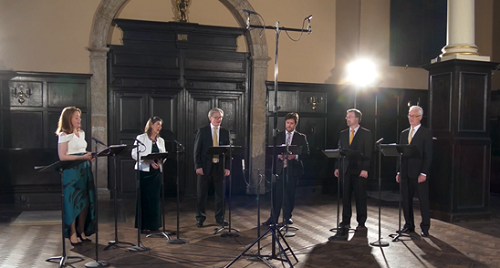
There is doubt, too, in the anonymous medieval poem, ‘Lenten is come’, in which, although spring brings flora and fauna to thriving, tuneful radiance, the poet-speaker declares that if the woman he loves does not return his passion he will abandon all happiness and flee to the woods, a fugitive. If there is a vocal ensemble that relishes text then it is I Fagiolini, and it was no surprise that the poem’s couplet and triolet rhymes and alliterative patterns prompted characterful illumination of spring’s bounty from the five voices, Robert Hollingsworth joining sopranos Anna Crookes and Rebecca Lea, tenor Mulroy and bass Charles Gibbs. But, the relaxed intimacy and chiming riot of colour and sound was ultimately quelled by the fear of rejection, and the gents crept ruefully away.
I Fagiolini do not prioritise uniformity – of timbre, phrasing and colour – over narrative and drama. This was thrillingly beneficial at the start of Herbert Howells’ ‘The summer is coming’ – a part-song written in memory of Arnold Bax for the Cork International Festival in 1965, setting words by the Irish poet Bryan Guinness (of the brewery family) – which both rejoices in the “gleaming coat of the grass” which begins to carpet the land, and laments, “Dark is the turf/ And grey is the stone/ And sad is the sky for the wild geese gone.” The opening reverie from Crookes and Lea was enriched by their individual vocal identities, and the subsequent entries built a powerful elegiac statement, at times blossoming effulgently, radiantly.
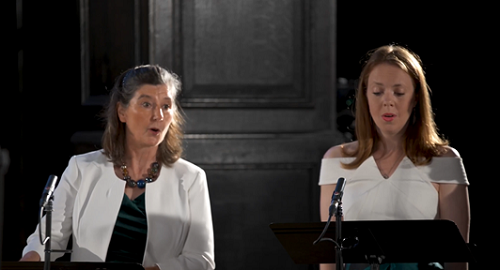
Brueghel’s Summer is a festival of harvesting: cherries, berries and wheat are gathered, scythes are laid down as water vessels are upturned and weary legs are splayed. Countertenor Peter Gritton flutingly heralded the arrival of the season in the medieval round, ‘Sumer is icumin in’, inviting his colleagues into a joyful melodic flowering above the gentle, steady foundations provides by baritone Greg Skidmore and bass Charles Gibbs. This was a lovely miniature preface to Heinrich Schütz’s ‘Die Himmel erzählen’, a setting of Psalm 119 in which all seven voices came together in celebration: “The heavens declare the glory of God, and the firmament shews his handywork.” As day spoke to day, and night to night (“Ein Tag sagts dem andern, und eine Nacht tuts kund der andern”), the antiphonal exchanges between low and high voices danced. Images were vivid – a bridegroom coming out of his chamber, rejoiced like a strong man running a race – pulsing with excitement and energy, and brightness reigned in the concluding praise: “As it was in the beginning … Amen.”
The summer heat gets to the heads of the protagonists of Clément Janequin’s La chasse, a sprawling, onomatopoeic, programmatic song which dramatises a royal hunt for a stag with visceral theatricality. The interplay of the varied individual voices of I Fagiolini – first four, then seven – had me on the edge of my seat as Janequin’s boisterous narrative and disorderly dialogue unfolded, unruly and, at times, raw. Of the stag’s footprints, it is remarked, “Good back, good heel, attached to strong limbs”. And, of the droppings: “Good and meaty … dense … moulded … well formed.” “They aren’t tapered … No, and they’re nicely coloured.” Local superstitions are vivid presences: old women crouching, magpies. Here, the French text pirouetted, as did the singers. The voices didn’t blend; instead, this was a real drama unfolding in real time. Occasionally it felt slightly chaotic, but always in the most disciplined sense! Pandemonium was pulled back from the brink in the resounding final cadence. This was absolutely brilliant music theatre. Tyaulau! Tronc! Bravo!
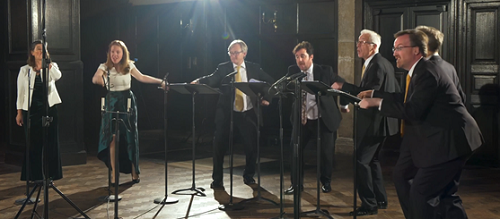
Autumn brings shadows. The pig is slaughtered; men stomp grapes; the leaves are falling; grey clouds gather. Josef Rheinberger’s Abendlied was a soothing transition to the fading of the light, the sun’s rays still rich of hue, but the brightness less piercing, the voices nestling together companionably. e e cummings invokes the children’s prayer, ‘Now I lay me down to sleep’, in his poem, ‘Now i lay (with everywhere around)’, reflecting on death and finding comfort in Nature’s endurance: sunlight is “only loaned” but “night and death and the rain are given; and given is how beautifully snow”. The “gently welcoming darkestness” is part of a cyclical process and not to be feared. Certainly, the sumptuous harmonic and sonic layers of Joanna Marsh’s now i lay – a new commission in which I Fagiolini were joined by VOCES8 – were a comforting blanket which cloaked singers and listeners in an assuring embrace. How glorious to hear the four sopranos rise, rise again and then summit still higher, above a pillowy expanse. But, cummings’ text matters, and the Marsh’s velvety textures make the words almost unfathomable. Night is “given”: that is, inevitable, a certainty, but also a gift, precious, perhaps divine – something that is felt rather than understood:
now i lay me down to dream of (nothing
i or any somebody or you
can begin to begin to imagine)
The poem’s parentheses interrupt the reader, suspend full comprehension. Only at the close do we understand that “now i lay me down to dream of Spring”. This revelation needs to be heard.
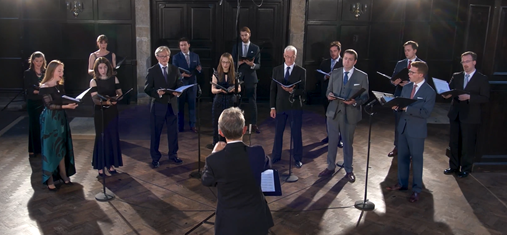
Verlaine’s poet-speaker passively forebears the long sighs of autumn in ‘Chanson d’automne’ and Robert Hollingsworth laconically lounged in the soloist’s chair in Leo Ferré’s setting of the French poet’s text, as I Fagiolini proved they can out-croon VOCES8! Melancholy, monotones and past memories may prevail, and the monochrome imagery was apt, but I Fagiolini tempered the shadows with gentle light and laughter.
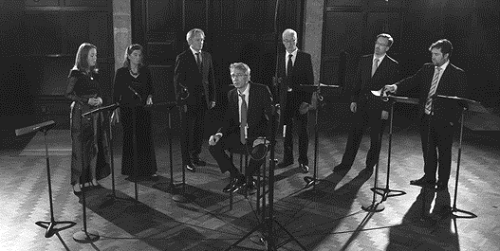
The cold bite of Brueghel’s Winter brings people together, in feasting, skating, drinking – community kindles the warmth. Ed Hughes’ setting of a text by Tom Lowenstein, Sun, new moon and women shouting, commissioned by I Fagiolini and first performed in 1996, takes the listener into realms more threatening and more transfiguring, evoking an ancient ritual in North Alaska when the winter solstice heralds for the first sunrise of the year, and the Alaskan Tikigag tribe chant from the roofs of their igloos as they ‘catch’ the sun.
Chanting and pulsing, rapturous and euphoric, I Fagiolini sang with a wonderful energy, intensity and fearlessness in this closing work, which told of moon spirits and whale myths: it was a sunrise, not a sunset.
Claire Seymour
I Fagiolini: Anna Crookes, Rebecca Lea (soprano), Peter Gritton (countertenor), Nicholas Mulroy (tenor), Greg Skidmore (baritone), Charles Gibbs (bass), Robert Hollingworth (director)
VOCES8: Andrea Haines, Molly Noon (soprano), Katie Jeffries-Harris (alto), Barnaby Smith (artistic director & countertenor), Blake Morgan, Euan Williamson (tenor), Christopher Moore (baritone), Jonathan Pacey (bass)
Au naturel: SPRING: Monteverdi – ‘O primavera, gioventù dell’anno, Britten – ‘Lenten is come’, Howells – ‘The summer is coming’; SUMMER: Anon – ‘Sumer is icumin in’, Schütz – ‘Die Himmel erzählen’, Janequin – ‘La Chasse’; AUTUMN: Rheinberger – ‘Abendlied’, Joanna Marsh – now i lay (world premiere)*, Leo Ferré – ‘Chanson d’automne’; WINTER: Ed Hughes – ‘Sun, new moon and women shouting’
* with VOCES8
St Anne and St Agnes, VOCES8 Centre, City of London; Saturday 14th August 2021.